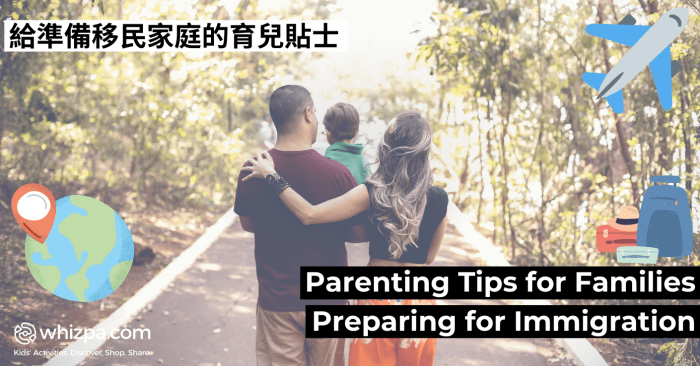
Parenting Tips for Families Preparing for Immigration
Moving homes can be an extremely stressful event, especially for families with kids. The logistics part of the move is as it is quite hard and then if you add to it the stress of managing your own and your family members’ emotions, it can all get a bit overwhelming.
Whizpa brings you five key parenting tips that’ll help you transition smoothly with your kids to a foreign country. Let’s have a read, shall we?
1. Allow Your Kids To Be Involved in Your Conversations - It is challenging to prepare your children emotionally and mentally for the change ahead. While some kids may seem excited and eager about the change, others may feel lost and confused. Teenagers, for instance, may feel let down, have occasional outbursts, or try to shut you out to avoid talking about the impending move. No matter what part of the spectrum your kids’ emotions lie in, it is key to empathise with them and prepare them psychologically for the new life ahead. Educate them about the reasons why the family is moving, and highlight what’s in it for them. It can help if you tell them about the rewards of the move - the pretty landscape, the new lifestyle, the luxury of more space, international schools, etc. You could give them a virtual tour on Google Maps and show them their new surroundings or plan a special family time to look for key landmarks together. If your kids enjoy different cuisines, show them some cool restaurants virtually. If they like outdoors, show them the picturesque of hiking trails. You get the drift!
2. Prioritise Your Children’s Social Needs- For a lot of children, losing friends and letting go of their schools/communities is a big concern. Reassure them that they can keep in touch with their friends. If they are old enough, provide a tablet or a laptop to help them stay connected to friends through social media. Help the middle schoolers create their own e-mail accounts. Let them practise emailing their friends a number of times and make it seem fun, before you actually move. This can help make the transition a bit smoother.
3. Ensure You Keep Some Things Constant – It may sound silly but do not underestimate the power of familiarity. Moving to a new country is a big shock to the system. As parents, you can mitigate the shock by keeping the basics and essentials constant throughout the transition time. For instance, do not forget to stock up your kids’ favourite cereal that’ll last them at least 1-2 months in the new country. Ensure you carry their favourite bed sheet or duvet cover to the new land. Carry the same deodorants/perfumes that your family has been using daily. Such things might offer an immediate sense of home to you and your kids. Kids thrive on routine and establishing consistent routines will make it easier for them to adapt to their new surroundings. So keep up with the Friday dinner outing, or Sunday afternoon movie time. Children will feel at ease knowing their family life maintains the same rhythm as earlier.
4. Pay Attention to School Related Decisions - At any age, it is terrifying for kids to change schools. They lose their current friends, their favourite teachers, as well as all the familiar staff faces. In other words, there is nothing comforting about moving to a new school and that too in a foreign land. Younger children might feel anxious or cranky. Older kids might have trouble fitting into a new culture and won't know, for instance, what's the right dress code (in case there are no uniforms), what kind of shoes or backpacks are considered ‘cool’, what slangs are popular, what kind of social etiquettes are to be followed, etc. So, in addition to simply looking for the right school and the friendly neighbourhood while moving, look out for what cultural nuances you need to be prepared for. It is also important to note that while it may seem easier to move countries during school holidays, it is best if you don't. It will be difficult for your kids to meet other children and other families during school vacations under normal circumstances. During the time of pandemic, everyone of course will be simply holed in. It is rather advisable to start schools as soon as you arrive to the other country and let your kids get in sync with the new chapter of their lives. The sooner they create their own social circle, the easier it will be for them to get acclimatised to the new environment.
5. Opt for a Sound Healthcare Plan - It may not seem important at first, but do not underrate the importance of a sound health care system. This is especially important if you have children. If it is your company that is moving you, make sure they have provided you with a robust family health care plan. If you are making the transition without a sponsor, research well which healthcare plans are going to be beneficial for your family. Also, it helps to research well if the same medications that your family is currently consuming are available in the new country. If not, stock up for at least 2-3 months just so you don’t stress yourself out trying to find an immediate alternative.
Moving to a new country, where you may or may not speak the same language, can be immensely daunting. As adults, we can lean on various tools and resources to help us tide through the change, but our children will surely look up to us to help them navigate through this mountain of a change. It’ll be helpful to spend time with kids and encourage them to ask questions. The more we answer prior to the move, the less anxious and insecure they will feel during and after the move. The key is to prepare them emotionally and manage their expectations in a warm and loving way.
If you have any tips around how you managed your move, do write to us. We’d love to hear from you.








